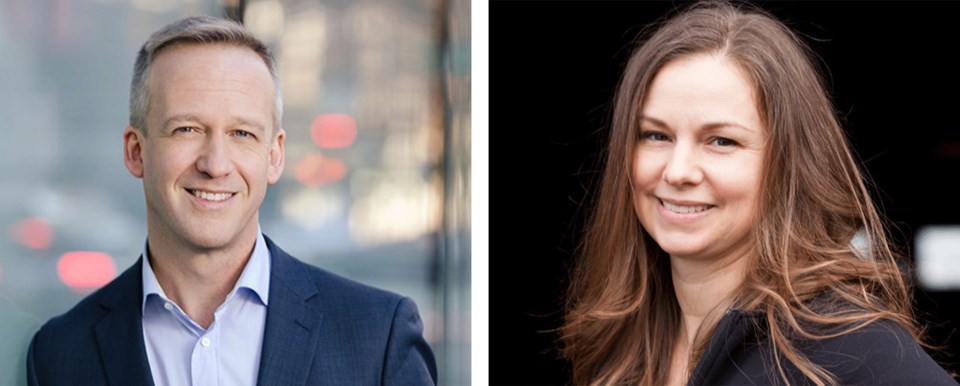Housing was the central theme during a discussion Thursday evening between two of the candidates running in the Oct. 19 provincial election to represent Port Moody-Burquitlam at the BC Legislature
BC NDP candidate Rick Glumac, who has served two terms as the MLA for Port Moody, and BC Green Party hopeful Samantha Agtarap touched on topics like the need for more housing, its affordability, the impact of growth on infrastructure, services like education and the environment as well as the lack of housing for the region’s most vulnerable residents during a casual 85-minute conversation at Old Orchard Hall. BC Conservative candidate Kerry van Aswegen did not attend the event.
Agtarap, who’s currently a Port Moody city councillor, criticized new legislation recently implemented by the BC NDP government to get more homes built, as being too single-minded in relying on private developers to fulfill housing targets imposed on local communities. She said that’s creating challenges for municipalities to ensure enough of those units are affordable for residents and infrastructure like roads, utilities, parks and recreation services can keep up with the growth. It also doesn’t offer anything for residents who have no means at all to find a stable place to live.
“We’re expecting for-profit housing to meet all our needs,” Agtarap said, adding there needs to be more provincial support for alternative housing options like co-ops as well as stable funding for infrastructure, something her party would provide through an annual $650-million fund to be divested to municipalities to spend as they require.
Glumac said the legislation does offer local governments tools to mould the housing mandates to suit their particular requirements, including the ability to set minimum thresholds for affordable units as well as enact inclusionary housing and rental protection bylaws.
“We’re trying to give municipalities the ability to build the right kind of housing to meet their needs,” he said.
Glumac said the BC NDP will help local governments that achieve their housing targets fill in their infrastructure holes, but municipalities must also be prepared to negotiate with developers so some of the costs of that infrastructure can be amortized over several projects.
Glumac admitted providing housing for those who have none “is one of the biggest challenges we face as a government.” But, he said, the BC NDP will continue to invest in building more.
Agtarap said that’s not enough.
She said the BC Greens would take a more “holistic” approach.
“We have to look at prevention rather than reaction,” Agtarap said. “Doing things one-off is a band-aid approach and it will cost us more.”
As for how the people living in all the new homes will get around on increasingly congested roads, Glumac said the BC NDP will continue to invest in transit projects like expanding SkyTrain to Langley so it reaches more people, while Agtarap said the BC Greens will work to make all transit free.
“In the end, free transit is money worth spending,” she said, adding her party would pay for such an initiative by reallocating funds from elsewhere in the budget.
Agtarap said the growing population is also putting extreme pressures on the education system, requiring more supports for students and teachers as well as more spaces to put them. She said funding for schools needs to be proactive, planning for the future rather current needs and creating flexible spaces that can be accessed by the community as well.
Glumac said the BC NDP is already stepping up by building prefabricated additions to numerous schools, but, he admitted, “there’s definitely more to do,” such as training more teachers.
True to her party’s roots in environmental protection, Agtarap said growth and the need for more housing and infrastructure must not come at the expense of the province’s natural assets, especially urban green spaces.
“Obviously we want to prioritize trees,” she said, adding that can be facilitated by respecting and following knowledge First Nations communities already possess.
Glumac said the urban forest is all part of creating “a complete community,” but “we have to do more.”
Other topics addressed in the discussion that was moderated by Robert Simons, the president of the Port Moody Foundation, included the future of British Columbia’s resource sector, opportunities provided by clean energy, the role of arts and culture in boosting the economy and even the prospect of either party balancing the province’s budget.



